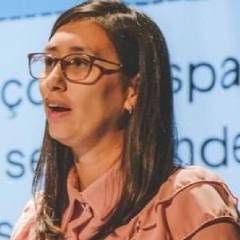
Desirée Nobre Salasar
Desirée Nobre Salasar is a research fellow on the INOMPOR project - The social role of innovation in Portuguese museums, at the Interdisciplinary Research Centre for Education and Development at the Lusófona University - University Centre of Lisbon.
She is a PhD candidate in Sociomuseology at the Lusófona University and a PhD candidate in Social Memory and Cultural Heritage at the Federal University of Pelotas (Brazil). She holds a Master's degree in Social Memory and Cultural Heritage (2020) from the Federal University of Pelotas (Brazil).
She is the coordinator of the postgraduate study group Sociomuseology and Cultural Accessibility of the UNESCO Chair in Education, Citizenship and Cultural Diversity. She has professional and academic experience in the field of accessibility, particularly in inclusive communication for people with disabilities in museums.
Her current investigation is a case study on the national monument Mosteiro de Santa Maria da Vitória (Batalha Monastery), focusing on inclusive communication from the perspective of Universal Design.
Áreas de interesse académico e científico Areas of academic and scientific interest
- Sociomuseology
- Cultural Accessibility
- Accessibility in Museums
PhD project
O princípio de uso equitativo e o acesso comunicacional a diferentes públicos nos museus nacionais
Doctor Mário Nuno do Bento Antas, Advisor
Abstract
This research is based on the first principle of Universal Design, the equitable use, applied to inclusive communication in museums, in order to reach universal audiences. The overall objective is to understand which elements enable the understanding of the textual components of an exhibition by diverse audiences, i.e. non-specialist audiences. The communication is a fundamental part and the national museums seek to be representative of the population, therefore it becomes necessary to find communicational methods that expand the fruition in these spaces. The methodology will be exploratory and descriptive and will rely on bibliographical research, technical visits and public studies. The corpus of the research will be composed of national museums under the tutelage of the General Directorate of Cultural Heritage. As a contribution, we seek equity and social justice in the access to the exhibited contents, pointing out reflections and practices that aim to discuss the privileged places of knowledge construction, memory production and social participation within the Portuguese national museums.



